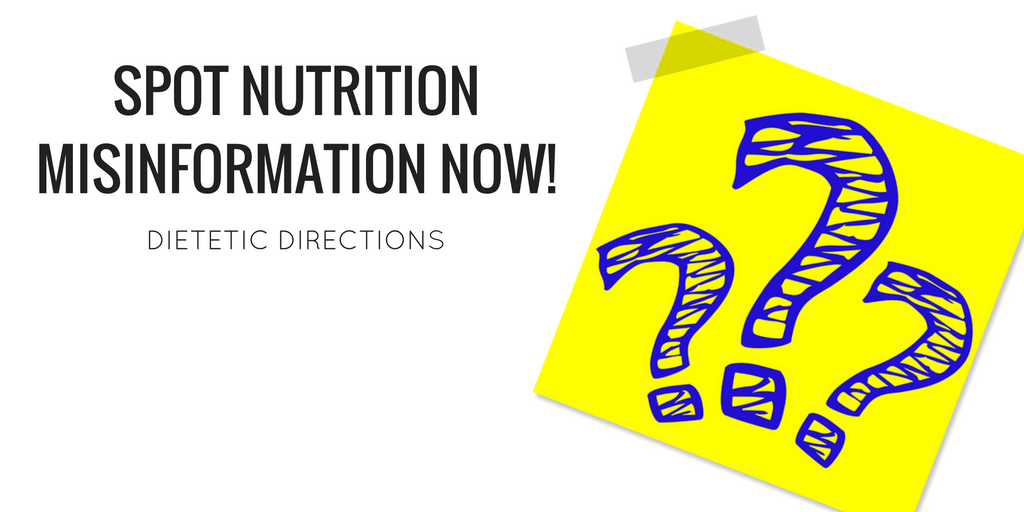
Spot Nutrition Misinformation NOW!
Let’s face it, people are more fascinated by nutrition than ever before. After all, we are increasingly aware how our eating habits impact our health. However, in light of this increased nutrition appreciation, consumers are now faced with an over-abundance of information. There are more self-proclaimed “experts,” superfoods and miracle pills then ever before! All clamouring for your attention (and your money).
If you want to be able to spot misinformation, you will need to know what questions to ask before shelling out your hard earned money! To help consumers distinguish fact from fiction, Dietitians of Canada has come up with five tips to spot misinformation.
Tip #1: Is it too good to be true?
Do you remember the last time you saw a “quick-fix” or “miracle pill” advertisement and thought, “Wow, this sounds too good to be true!” I hope you hadhealthy skepticism before believing the product claims. I remind clients regularly that the weight loss business is a multibillion-dollar industry that is largely unregulated. This means new products come out daily and can make outrageous claims and empty promises in order to get your attention and your money. Before shelling over money, ask yourself if this is “too good to be true”, and if it sounds too good to be true… it likely is! Check out my Dr. Oz rant on hisbogus product endorsements.
Tip #2: Does the information tell you something, or sell you something?
Be cautious if a company (or person) is trying to sell a product instead of teaching you how to make better food choices. Sales people want you to believe that their product is the ONLY solution. It is naïve, erroneous and possibly dangerous to believe. Instead, seek information that provides several different approaches to your success.
Tip #3: Beware of Personal “Success Stories”
Infomercials, radio and Internet ads all use testimonials to gain consumer trust without having to share the facts! Testimonials can be phony or embellished and appeal to emotions instead of research showing that this product is effective.
Tip #4: Is the claim based on a single study?
A “new study” finding often makes the news headlines because it is contradictory to what was previously believed. Coffee is a common “good” or “bad” target. However, a “new study”, does not mean it is well conducted or better than previous studies. Before believing the “study” quoted, find out if results are based on a single study or were multiple studies conducted that came to the same conclusion? We could also ask questions such as: was the study done with animals or humans? How many subjects were studied? What follow-up period was used to measure results? Or who sponsored the study? These are a few of the questions that dietitians and medical professionals ask in order to provide advice based on strongest study designs.
Tip #5: Question qualifications
Think about it: You wouldn’t ask a celebrity how to build a safe bridge; you’d ask a professional engineer. You also wouldn’t ask a celebrity to fill your cavity, you’d ask a dentist. The same expertise needs to be applied to nutrition! Dig deeper to find out a person’s credentials before believing what is being said. The title Registered Dietitian (RD) is protected by law, just like a medical doctor, nurse, dentist or pharmacist. Dietitians are the only regulated nutrition professional. By looking for trusted qualifications you will have support in ensuring that advice is from a trusted source.
Spot Nutrition Misinformation NOW! Click To TweetBottom Line:
Before believing the next nutrition claim ask yourself these five questions: Is this too good to be true? Is this information trying to sell me something? Are only testimonials being given instead of research? Are claims made based on a single research study without understanding the scientific merit or rigour? Finally, what are the person’s qualifications? Dietitians are committed to evidence-based practice, which means recommendations are based on the best available evidence. Good luck spotting the misinformation!



